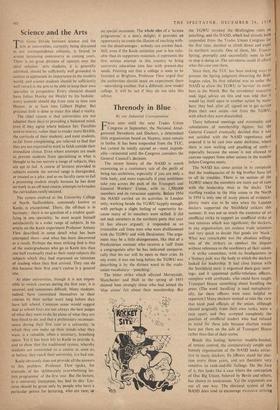Science and the Arts
Till. Great Divide between science and the arts at universities, currently being discussed in our correspondence columns, is bound to arouse increasing controversy in coming years. There is no great division of opinion over the ideal solution : arts students, it is generally admitted, should be sufficiently well grounded in science to appreciate its importance in the modern world; and science students should be sufficiently well versed in the arts to be able to keep their own speciality in perspective. Every classicist should have Julian Huxley (or Hoyle) by his bedside: every scientist should dip from lime to time into Homer, or at least into Gilbert Highet. But precious little is done to make this ideal a reality.
The chief reason is that universities are not adapted these days to providing a balanced mind, even if they agree where balance lies. Faculties tend to restrict, rather than to render more flexible, the curricula of their students; and most students, so far from complaining, are relieved to find that they are not expected to work in fields outside their immediate choice. Even where attempts are made to prevent students from specialising in what is thought to be too narrow a range of subjects, they are apt to fail. A course of 'lectures provided in subjects outside the normal range is disregarded, or treated as a joke; and as no faculty cares to fail a promising student simply because he has done no work in an off-beat course, attempts to broaden the curriculum rarely succeed.
The system evolved at the University College of North Staffordshire, commonly known as Keele, is exceptional. There, the off-beat is .in harmony : there is no question of a student quali- fying in one speciality; he must acquit himself satisfactorily in a wider range of subjects. In his article on the Keele experiment Professor Antony Flew described in some detail what has been attempted there—and what has been discovered as a result. Perhaps the most striking find is that of the undergraduates who go to Keefe less than one half eventually read as their main subjects the subjects which they had expressed an intention of reading when they first arrived. They can do this because their first year's course is a general one.
At older universities, though it is not impos- sible to switch courses during the first year, it is unusual, and sometimes difficult. Many students, indeed, have committed themselves to their courses by their earlier work long before they have left school. Common sense would suggest that at school boys are not always the best judges of what they want to do, let alone of what they are best fitted to do; and that a preliminary reconnais- sance during their first year at a university, in which they can make up their minds what they want, is a valuable, often a necessary, breathing space. Yet it has been left to Keele to provide it, and to show that the traditional system, whereby students are committed to a course as soon as, or before, they reach their university, is a bad one.
Keele obviously does not provide all the answers to this problem. Professor Flew spoke, for example, of the 'deliberately overwhelming lec- ture programme' of the first year. But the lecture, as a university institution, has had its day. Lec- tures should be given only by people who have a particular genius for lecturing, who are rare; or
on special occasions. The whole idea of a 'lecture programme' is a don's delight; it provides an opportunity to create the illusion of teaching with- out the disadvantages: nobody can answer back. Still, even if the Keele initiation year is less valu- able than its supporters maintain, it represents the first serious attempt in this country to bring university education into line with present-day needs. Pointing out that a college is soon to be founded at Brighton, Professor Flew urged that the authorities should insist on, experiment there —nourishing,another, but a different, new model college. It will be sad if they do not take this advice.


























 Previous page
Previous page